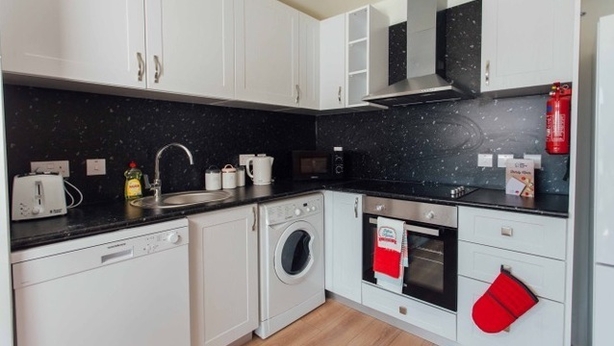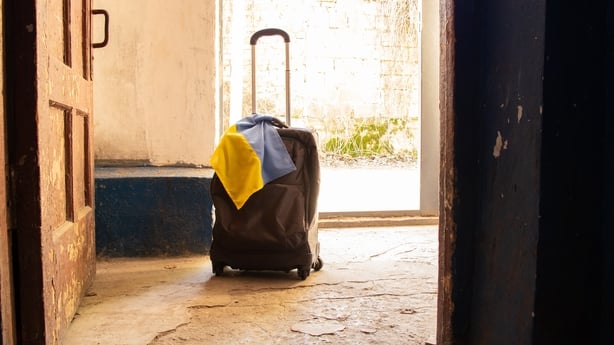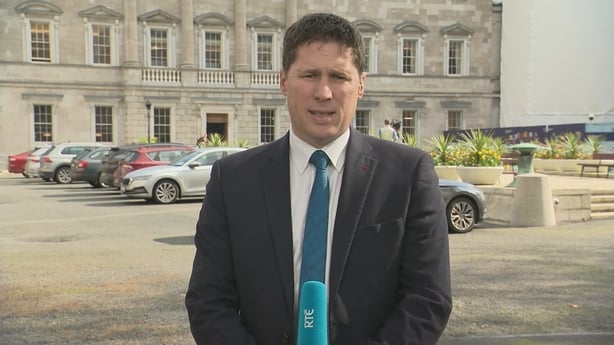The Cabinet has agreed a new comprehensive accommodation strategy for International Protection applicants, which seeks to address the current shortfall in beds while reforming the system over the longer term.
The reforms will see a move away from full reliance on private providers and towards a core of State-owned accommodation, delivering 14,000 State-owned beds by 2028.
This is quadruple the previous commitment under the White Paper.
It will be supplemented, as required, by high standard commercial providers according to a statement issued by the Department of Integration.
The aim of the strategy is to end the use of unsuitable accommodation options currently relied upon, such as the sole hotel remaining in a given town, according to the statement.
Accommodation will be delivered through a multi-strand approach.
This will involve use of State land for prefabricated and modular units, the conversion of commercial buildings and the targeted purchase of medium and larger turnkey properties.
There is also a plan to design and build new Reception and Integration Centres and upgrade IPAS centres - formally known as direct provision centres.
A number of State-owned sites have been identified, with assessments under way for use, according to the department, which intends to bring the first sites into use within months.
In addition, an expression of interest for possible purchases of accommodation will issue in the coming weeks.
While delivering State-owned assets through purchase, build and the use of State land, the delivery by commercial providers will supplement State-owned beds, and seek to "raise the overall standard of accommodation within the system".
In addition, the phased and planned approach to accommodation will allow for "enhanced community engagement" to ensure planning for the provision of essential public services and to assist with the welcome and integration of new arrivals.

'Reiteration of promises made previously'
The Government's plan to accommodate International Protection applicants appears to be a reiteration of promises made previously, according to the Social Democrats TD Jennifer Whitmore.
The Party's Spokesperson on Integration said the government had committed to the use of modular homes and commercial buildings a number of years ago.
"What I think is really important from this point onwards is that we see delivery, we need government to move from this emergency footing to a long-term sustainable implementation of immigration policy," she said.
The Wicklow TD said the plan could have come a lot sooner, however, she said now it needed to be delivered quickly, particularly reception centres.
She stressed the need for the incoming Taoiseach to lead the Government in implementing the strategy.
"It can't be left to one department because we've seen that by leaving it to one department, it essentially not working properly," she said.

System in 'desperate need of reform' - O'Gorman
Minister for Integration Roderic O'Gorman said the strategy ensures the State "holds the reins on accommodation, its location and its standards".
"It's clear that the current system of accommodation isn’t working," he said.
"Since the system was put in place more than 20 years ago, the State has almost been entirely reliant on private providers."
Mr O'Gorman added that the reliance on private providers leads to difficulty in planning and managing and a lack of control over the location of accommodation which "are compounding the many issues" surrounding migration.
Even prior to the recent increase in International Protection applicants, he said, the system was in "desperate need of reform".
"Now, it’s reached crisis point, we must solve both the immediate crisis but also put in place reforms that ensure the State does not end up back in this situation again," the minister added.
Mr O'Gorman said the strategy sets out three key measures to ensure the delivery of additional bed spaces in the coming months to bridge the gap between the immediate crisis and long-term reform.
First, the Department of Integration will be provided with State lands to quickly bring on stream accommodation through renovation and rapid builds.
Secondly, the department is being supported financially by the Department of Public Expenditure through new capital ceilings to allow the targeted purchases of medium and larger properties in turnkey or near turnkey condition.
Thirdly, the Government will further extend planning exemptions to allow for the conversion of commercial properties to International Protection accommodation, with a focus on empty office blocks.
Mr O'Gorman said that work on the delivery of extra accommodation through these strands has begun and will deliver significant additional accommodation in the coming months.
Planning exemptions 'problematic'
Independent TD for Clare, Michael McNamara, has said that planning exemptions under the new strategy is problematic, saying the move could "create resentment".
Speaking on RTÉ’s Drivetime he said: "There is no other area where you can have a permanent development put up beside you or a development change for permanent use without any consultation with the public or representatives.
"If you wanted to build an office block or change an office block into a nursing home or hospital, regardless of what you want to change something to, there has to be consultation, there is no consultation envisaged in this and I think that’s going to create resentment."

The vast majority - 96% - of accommodation is privately-provided, leaving the Government with little control over where it is located and its condition, Mr O'Gorman said.
The strategy will ensure central State-owned beds, guaranteeing accommodation for a defined number of applicants each year, the minister added.
As well as an additional 14,000 extra beds in State-owned accommodation by 2028, Mr O'Gorman said, State-owned accommodation centres will be upgraded to reception and integration centres.
Centres in Athlone, Co Westmeath and Knockalisheen, on the Clare-Limerick border, will be the first to be upgraded.
Mr O'Gorman said Ireland’s current inability to accommodate all those seeking International Protection is a "hugely serious situation facing us".
In drafting and implementing the new strategy, he said, the Government recognises the "urgency of the immediate situation and is setting out measures to address it".
"It also lays out a clear pathway to a more sustainable reform of International Protection accommodation, a reform which will give a stability centred around that core of State-owned beds," the minister added.
"We know these reforms can’t be implemented overnight. However, to ignore this need for reform, would serve to only worsen the situation. Government is taking a really important step today."
Read more:
Revised plan on ending Direct Provision set to stick to original principles
EU asylum and migration pact
Meanwhile, Minister for Justice Helen McEntee is separately proposing that Ireland opts into the EU asylum and migration pact.
The EU asylum and migration pact represents a European effort to respond to the challenges of asylum and migration.
By opting in, the Government will be committing Ireland to introducing a programme of legislation, which will replace the International Protection Act of 2015, within the next two years.
Speaking at a Government press conference, Ms McEntee said joining the new pact would represent the "biggest reform of Irish immigration law in decades".
"Those who need asylum are badly served by a system which should be for them but are being used by others," she said.
"It is in that context that this pact represents a major European effort to respond in a better and a more aligned way to these challenges, while also dealing with the fact that there are significant numbers of people on the move due to war, due to conflict, due to starvation brought about by climate change, and we need to respond to all of these challenges."
We need your consent to load this rte-player contentWe use rte-player to manage extra content that can set cookies on your device and collect data about your activity. Please review their details and accept them to load the content.Manage Preferences
She said a review of the list of Ireland's safe countries had begun ahead of the introduction of any new legislation relating to the EU Migration and Asylum pact being introduced, which will determine if new countries can be added at this time.
Minister McEntee said the legislation will create legally-binding timeframes for making quicker decisions on international protection applications and appeals.
She added that there will be a greater focus on efficient returns for unsuccessful applicants, accelerated processing including for those from safe countries, those with false or no documents and those who crossed borders illegally.
A new border procedure will process people who are particularly unlikely to be granted protection more quickly as well as new dedicated accommodation for those who are being processed in the border procedure, she said.
A new solidarity mechanism will require countries to make financial contributions or agree to relocate asylum seekers from countries facing particular pressures.
Ms McEntee said this is a mechanism Ireland "could indeed benefit from in the future".
The category of migrants who will be fingerprinted and checked against the EURODACT database will be expanded, she said.
She said if Ireland does not opt in to the pact, "we are essentially on our own dealing with what is a global challenge".
Since the introduction of accelerated processing in November 2022, the number of cases from safe countries have dropped by 38% according to the Department of Justice.
An initial decision for a person coming from a safe country is now made in around 60 days.
Ireland should not fully opt in, says Sinn Féin
Sinn Féin Spokesperson on Foreign Affairs said the party does not think Ireland should opt in fully to the EU Migration Pact.
Matt Carthy TD said: "I think it would be a mistake for Ireland to opt in to the entire set of regulations on the EU Migration Pact.
"Setting your immigration and asylum laws is a key area of national sovereignty that should be protected.
"Ireland is one of only two states that has the option to opt out of these regulations, and we believe in the vast majority of instances we should be availing of that opportunity."
He said there were seven regulations as part of the pact, saying Sinn Féin believed there were two in which there is "merit in Ireland considering an opt-in".
The ability to return people to the first country in which they made an application, and in relation to checks and vetting procedures, but he said in all other instances, policy should be set nationally.

Fine Gael Senator Barry Ward said the pact would improve the efficiency of Ireland's immigration system and deliver a better service for those arriving into the country.
He told RTÉ's News at One: "This is all about streamlining and improving the efficiency of the process which hasn't worked in many respects.
"This is a system that will allow us to plug into all kinds of other systems within the European Union.
"And perhaps most importantly, creating legally binding timeframes for the Government to deal with applications for international protection so the people who come here will have a decision faster, they will know if they have permission to stay or whether they are going to have to go home or not."
New rules on student-specific accommodation
Separately, student-specific accommodation will have to offer leases covering the academic year under proposed new laws that went to Cabinet today.
Minister for Further and Higher Education Simon Harris and Minister for Housing Darragh O'Brien are seeking Government approval to amend the Residential Tenancies Act (RTA) 2004-2022.
It is intended that the new rules will come into force prior to the next academic year.
Students can opt to stay for up to 51 weeks if they wish, but they must be offered a shorter accommodation lease.
The standard student accommodation undergraduate lease duration is 38 to 40 weeks.
Separately, Minister for Health Stephen Donnelly is updating Government on the 2024 Waiting List Action Plan.
The main targets include a further cut of 10% in those waiting for care longer than the Sláintecare 10-12 weeks.
A 90% reduction in patients waiting over three years or at risk of waiting over three years is also planned.
Funding of €437 million has been allocated to reduce waiting lists in 2024.
Minister for Transport Eamon Ryan also obtained Government approval for a new draft transport strategy to manage and reduce congestion.
This will prioritise the roll out of measures in urban areas where there is greater public transport, walking and cycling.
Additional reporting Juliette Gash, Fiachra Ó Cionnaith






